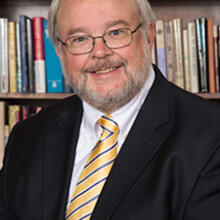If cynicism is the sin of our age, then ongoing paralysis in Washington is a huge occasion of sin and a temptation to despair. Washington is “de-moralized,” unable to launch its health care Web site, keep government functioning, enact budgets or pass immigration reform. Washington is “de-moralized” by a House faction that paralyzes their party and the nation with disdain for compromise and for government itself. They did not repeal “Obamacare” but did divert attention from the administration’s failure to get its Web site working and state disputes over Medicaid and health insurance exchanges (and an unwise battle over mandates and religious freedom). We also learned that the House gym is “essential” and that providing nutrition to newborns is not.
Washington has lost its way, cutting food stamps for the hungry and continuing subsidies to agricultural interests, cutting essential investments but not tax loopholes. As John Paul II warned us, we are losing “the ability to make decisions aimed at the common good,” examining “demands not in accordance with criteria of justice and morality, but rather on the basis of the electoral or financial power of the groups promoting them.” Washington is driven by two kinds of excessive individualism: lifestyle individualism, which makes “choice” the ultimate criteria, and economic individualism, which makes the market the measure of all of life.
Much has been on display in Washington, but something important is missing. There was no call for sacrifice for the common good, for the poor and vulnerable or for future generations. “Sacrifice” doesn’t poll well or raise campaign funds, and Washington runs on polls and political money. But we should consider modest sacrifices in three areas.
Growing inequality and persistent poverty. Increasingly, our economy distributes benefits upward and burdens downward. Gaps between rich and poor are growing, and ladders of opportunity are disappearing. Economic pressures and family factors are leaving many children behind. The younger you are in the United States, the more likely you are to be poor. Yet the U.S. government spends seven times more on the elderly than on children, with more going for the health care and retirement of the elderly, regardless of financial situation. In family life, parents sacrifice for their children; in national life, this is reversed.
The cost of war. The burdens of war are increasingly borne by fewer and fewer Americans. The all-volunteer military and failure to actually pay for wars have left many indifferent toward the costs of combat in Iraq and Afghanistan. My only sacrifice in the war on terror is more time at airport security. Others pay a profoundly higher price, including sacrifice of their lives. Many bear wounds, physical and psychological, that will last all their lives. Washington sends other people’s children to fight our wars and asks nothing from the rest of us.
Environment. Addressing climate change and environmental threats requires prudence and sacrifice for the common good. The longer we delay, the greater the environmental and human impact will be in future generations. Those who contribute least to the problems will be hurt most and have the least capacity to respond. Washington ignores future threats, but the costs— financial, environmental and moral— grow with time and neglect.
Washington’s de-moralization should yield to honest debate and courageous decisions about sacrifices to protect the lives and dignity of our children and grandchildren. We should recall the inaugural challenge of President John F. Kennedy, struck down 50 years ago: “Ask not what your country can do for you, but what you can do for your country.” Religious voices should lead the way. Sacrifice for others and priority for the poor may be politically incorrect, but they are religious obligations. Pope Francis has set a standard: “The measure of the greatness of a society is found in the way it treats those most in need, those who have nothing apart from their poverty.” Francis also reminds us: “Politics...is one of the highest forms of charity, because it serves the common good.... We all have to give something.” Good advice for a de-moralized Washington.








